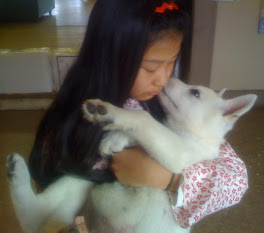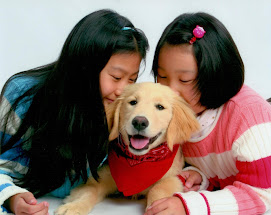In the book "Marley & Me", John Grogan said "A dog doesn't care if you're rich or poor, educated or illiterate, clever or dull. Give him your heart and he will give you his."
Why is it a lot easier for a dog to bond well with someone in his whole lifetime with only basic care while a human struggles in his/her relationship on regular basis even with high maintenance?
We are the most advanced "animals" right?
We have the smartest brains, yet our talents are wasted in busily calculating how much we should put in and get back.
We are ultra sensitive with our well developed nerves, which are often utilized to detect things that we THINK can hurt us.
We are supposed to be the best communicators in the world, yet even with modern technology we either don't communicate enough or miscommunicate to people we care about.
We are the most driven species on earth. We constantly seek things better than what we already possess and never seem to be happy for too long about the grass in our side of the fence. Our satisfaction and excitement get worn out easily, and then we are left with disappointments and boredom fairly quickly.
So we humans fail to maintain meaningful relationships over a long period of time just because we are blessed with the best brains, sensitivity, communication skills and motivations?
Why we lack the willpower to remain committed or disciplined despite our religion and education?
There is a word in Chinese 恸 that means extreme sadness or crying one's heart out. Like 90% of the Chinese words, it is a typical phono-semantic compound character (形聲字) that one side offers hint for the meaning of the word while the other side shows its pronunciation. In 恸's case, the left side means "heart", the right side means "touch" or "move" which also gives clue to the sound of the word.
One Chinese scholar once explained this word from a philosophical standpoint. He says in a relationship, a person is like standing in a thorny field -- he is safe if he stands still and does not make a bold move, but once he changes his "heart" position and falls for someone, he is bound to get pinched all over and feel the pain of getting hurt.
This reminds me of Taoism that preaches the values of being neutral, indifferent and inactive. Positive attributes in the western world like persistence and devotion are viewed as drawbacks of character because they make a person harder to get detached from this materialistic and chaotic world that is overflowing with desires, which are often the very source of sin, evil, dissatisfaction and unhappiness.
In a practical way, this philosophy also emphasizes on the importance of self-protection and satisfaction for a person to live with minimal desires. When one does not hold his hopes too high, he is not disappointed by the outcome and thus can stay easily satisfied and happy.
Similarly, a Chinese "chicken soup for the soul" I read the other day also concludes that "one is happy not because he possesses much, but because he cares less".
How our dogs get excited to greet us every time we come back home, jump up and down, wag their tails fervently, and never get tired of following us like shadows from room to room day in and day out?
Why dogs can consistently offer so much to humans without hoping to get adequate love, care and attention back?
It is said that in our human world of "give-and-take", our one year is equal to 7 dog years. So could it be the combination of their ignorance, insensitivity, single vocabulary of "arf", and 3-second memory makes dogs appreciate 7x more and demand 7x less, and thus happier than us humans?
Kyra Sedgwick once said this about her Golden Retriever: "He taught me about commitment and showing up for someone even if you are not feeling in the mood. I think that having a pet can really do that for you and can teach you about being in a relationship and giving and receiving love."
Perhaps we should try a bowl of kibble everyday, maybe that can help improve our attitude.
Lastly, I have a friend who has an unusually long but profound Chinese I/M name: "记住该记住的,忘记该忘记的" ("Remember what you should remember, forget what you should forget").
Perhaps we should also learn from our dogs to " 改变能改变的,接受不能改变的" ("Change what you can change, accept what you can not").
skip to main |
skip to sidebar



"执子之爪,与子偕老" 诗经篡改



Blog Archive
-
▼
2009
(48)
-
▼
September
(23)
- "I love you not because of who you are"
- Hiding from Caitey in the house
- Something to amuse you animal lovers
- Strike Sunday
- Sad Saturday
- So you want a Golden puppy
- Chinese Mom and "Story of The Fox"
- Caitey's vocabulary
- Caitey's frends in the neighbourhood
- Training class for Caitey
- What can dogs teach us about relationships?
- Caitey is on hunger strike!
- The Venza
- Caitey's 1st swimming experience
- The Chinese and the dogs
- Caitey's 1st night in the crate
- Caitey's Vet Visits
- Caitey could stay, thanks to Annie!
- Caitey's 1st week at home
- Aug 22nd 09 -- Caitey came home.
- Aug 20th 09 -- We have found Caitey!
- The Desperate Search for a Golden
- Before it is too late!
-
▼
September
(23)